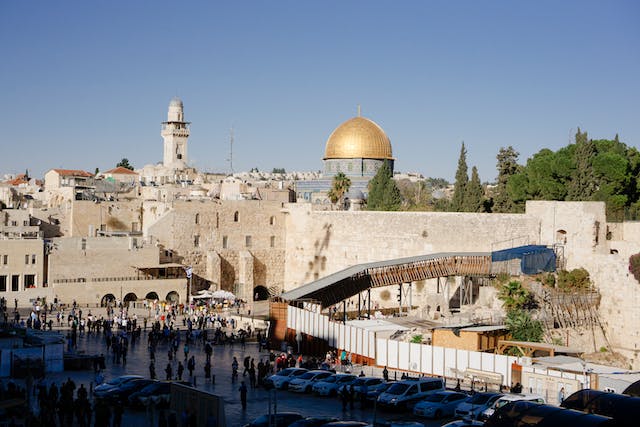
The war in the Middle East, which entered a new phase last October following the bloody attack on Israel carried out by the terrorist organisation Hamas, has not only had disastrous consequences for international tourism in the country, but has also had a knock-on effect on the hospitality industry in neighbouring countries.
It is well known that ecumenical tourism is a form of travel that promotes understanding and respect for religious and cultural diversity. This type of tourism focuses in particular on visiting holy and spiritual places. The main aim of ecumenical tourism is to facilitate interfaith dialogue and promote peace and understanding between different religious communities. During ecumenical travel, tourists have the opportunity to learn about the beliefs, practices and history of the religions visited, thus helping to promote interfaith tolerance and harmony. This form of tourism can have a positive impact on local economies as it attracts tourists from all over the world, generating income from tourist services and the sale of souvenirs and traditional products. However, ecumenical tourism can also pose certain challenges, such as preserving and protecting sacred sites from over-exploitation and mass tourism, and ensuring respect for local practices and traditions.
Although the decline in foreign tourists is just one of the many economic consequences of the war, it poses a significant risk not only to Israel’s economy, but also to other countries in the region that are dependent on tourism revenues. But the crisis in the Middle East also has repercussions for the business plans of tour operators in other countries, including Europe. These include Romanian companies, whose recovery from the crisis caused by Covid has been helped by package holidays sold in Egypt – one of the first countries to relax travel conditions as much as possible during the troubled times since the end of the pandemic – and pilgrimages to Israel, especially – but not only – around the main Orthodox Christian holidays. While Romanian tour operators are still optimistic about the sales of holiday packages to Egypt in 2024, despite the cancellations at the end of last year, pilgrimages to Israel or Israel-Jordan holiday packages have disappeared from the offer of most travel agencies operating in Romania. At the Romanian Patriarchate’s travel agency, pilgrimages to the Holy Land are not missing, but their price has increased significantly compared to last year, making religious trips to Greece more viable, a country that is closer (many Romanians prefer to travel by car), safer and that sells such packages at much cheaper prices.

The war in Israel has affected all segments of tourism, from discounts to cancellations of stays, tours, cruises and charters in this country. For tourists from many countries, last year’s cancellations for this year’s summer season were also helped by constant travel alerts issued by foreign ministries, ranging from Israel and Lebanon – the main scene of the conflict – to northern Egypt. Moreover, the Foreign Ministry in Bucharest has also issued travel alerts on Jordan, which “in terms of geopolitical and security context, is surrounded by military conflicts and terrorist activities – Syria, Iraq, DAESH/ISIS issues, the MPOM dossier and the conflict in Yemen, which may export elements of risk to this country.”
Tourism in North African countries in free fall
According to an analysis published earlier this year by The New York Times, while some travel agencies in Egypt have faced booking cancellations of between 40% and 50%, the situation in Lebanon is disastrous, with tourists avoiding it despite being given assurances that the country is “100% safe” and despite massive investment in popularising the capital Beirut as the “Paris of the Middle East”. Even tour operators selling packages to Saudi Arabia have serious concerns about a prolongation of the Middle East conflict. The country, recently integrated into the international tourism system, is part of the turnaround plans of tour operators in the region, especially as its authorities have pledged $80bn of foreign investment in tourism.
According to the same publication, which cites officials from a ticketing firm, it was not just bookings for flights to the Middle East that fell by about a third in the immediate aftermath of the October conflict in the Gaza Strip compared to the same period in 2019, but “people’s confidence in air travel itself”. Speaking of Israel, in November last year alone, the number of flights to the country’s airports fell by more than half, from around 5,000 flights to around 2,000 flights. The war has come at the worst possible time for tourism in the region, which has been on a slight rebound after the heavy blow it took during the Covid pandemic. According to figures reported by the UN Tourism Organization, in the first half of 2023, the number of foreign tourists visiting the Middle East was 20% higher than in the same period in 2019.
According to figures published by Reuters in January, citing Israeli tourism officials, although overall the number of foreign tourists visiting Israel increased in 2023 compared to 2022, in the last quarter of the year they plummeted. Thus, the number of foreign tourists was 3 million in 2023, but the monthly average of about 300,000 was not even close in the last three months, with December being the worst for income, with only less than 60,000 tourists.
Under these circumstances came the – somewhat desperate – appeal by Israeli Tourism Minister Haim Katz to the Jewish and Christian communities in the US to resume their holidays in the Holy Land: “come, don’t just donate, because supporting tourism is the best way to support us,” reports the Jewish Insider.
Romanian tourists among main pilgrimage clients in Israel
Romanian tourists have for years been among some of the main clients of pilgrimages in Israel, along with American and British tourists. As far as the European top, Romanians were, in 2023, in the top 10 for holidays to Israel and, worldwide, in the top 10.
At the Basilica Tourist Agency of the Romanian Patriarchate, the main organiser of pilgrimages to the Holy Land, the cost of a 5-7 day stay was between 800 and 1000 euros and included transportation – by plane to Israel and by bus within the country, accommodation, breakfast and dinner, entrance fees to the sites. The cities on the programme were both in Israel and Palestine – Jerusalem, Nazareth, Bethlehem, Tiberias. Now, according to the offer on the Agency’s website, prices have increased by about 30%.
This year, for fear of war and because of the prices, pilgrimage enthusiasts prefer Greece or the much cheaper domestic circuits. Here, for four days and coach transport – Greece is accessible by coach for Romanian tourists – prices for a four-day package start at around 170 euros and go up to 300 euros per person. As a consequence, the number of Romanian tourists opting, for example, for pilgrimages to Mount Athos has doubled since October. For tours to Romanian monasteries, prices are even lower and start from around 70 euro/person up to a maximum of 200 euro for 2-6 days.
For other travel agencies, bookings for Israel for 2024 are much lower than expected or, in some cases, have been “totally cancelled” as some travel agency owners confessed at the end of the year. Jordan – where in the years before the pandemic, even integrated packages with a visit to the Holy Land were selling well – is not as well booked as expected either, with cancellations around 30%. The only hope for tour operators looking to sell Middle East package holidays in 2024 remains Egypt. Tour operators hope that, as with the war in Ukraine, the world will “get used to” the war in the Middle East, and see that it is not felt in the resort of Sharm El-Sheikh on the Sinai Peninsula, a favourite location for Romanian tourists choosing Egypt.



 Subscribe
Subscribe